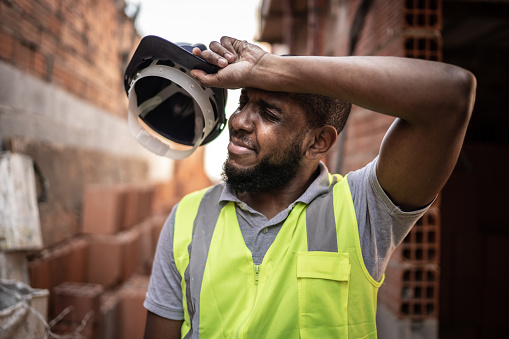How To Prevent Heat Illness While Working at a Construction Site

Heat-related work injuries often occur during the summer at construction sites. That’s why construction companies and workers must do everything possible to prevent such serious construction accident injuries.
But what steps can companies and workers take to avoid heat illness at construction sites? Below, you can learn more about the warning signs of heat illness and tips to stay safe while on the job site.
Common heat-related work injuries
Heat illness, heat stroke, heat exhaustion, and other heat-related injuries often occur on the job. In 2019, a total of 43 people died due to work-related heat injuries, according to workplace accident statistics from the U.S. Bureau of Labor Statistics (BLS).
And when it comes to different industries, construction workers face the highest risk of dying or being injured on the job due to heat-related illnesses. In particular, construction work “had 13 times the risk of heat-related deaths than the average annual heat-related workplace fatality rate in all other industries,” according to a recent Equipment World article.
That’s why the U.S. Department of Labor’s Occupational Safety and Health Administration (OSHA) recently started an educational program focusing on educating construction companies and workers about the dangers of working in dangerously hot weather.
Warning signs of heat illness
Construction companies and construction workers must pay close attention to the warning signs of heat illness and other heat-related injuries. Symptoms of heat illness often include:
- Dry skin or excessive sweating.
- Dizziness and difficulty concentrating.
- Extreme tiredness and fatigue.
- Nausea and vomiting.
- Frequent and severe headaches.
If something doesn’t feel right, construction workers need to act fast. Otherwise, they could put themselves and their co-workers in danger.
Ways to prevent heat illness on construction sites
There are many steps that construction workers and construction companies can take to avoid heat-related injuries and accidents. Preventative measures include:
- Educate construction workers about the dangers of working in high heat and explain what warning signs of heat illness to look for on the job.
- Make sure construction workers have enough water to drink throughout their work shift, especially if where they’re working is consistently above 80 degrees.
- Frequently check on construction workers throughout their work shift to ensure they’re safe and not suffering from heat stroke or other heat-related illnesses.
- Slowly acclimate workers to working in warm-weather conditions.
- Shift when workers work to cooler times of the day, perhaps earlier or later.
- Provide cooling stations where employees can take a break and cool down.
These are just some steps companies and employees can take to prevent heat illness at construction sites. But unfortunately, despite such efforts, heat-related injuries often involve construction workers. Therefore, it’s important that injured construction workers fully understand their legal rights and talk to a lawyer as soon as possible.
How a construction accident attorney can help
Injured workers have the right to seek workers’ compensation benefits, but the process isn’t always easy, especially in cases involving heat-related injuries and illnesses. That’s why the sooner you have a construction accident lawyer handling your heat illness claim, the better. Your attorney can investigate your injury and help you navigate the workers’ compensation process.
The construction accident lawyers at the Law Offices of Deborah G. Kohl understand how the legal system works. That’s because we have been helping injured construction workers in Rhode Island and Massachusetts for decades. When you have our legal team on your side, you can demand the money you need and deserve.
Discover what we can do for you. Contact us and schedule a free case evaluation with a construction accident attorney who knows how to build strong legal cases. We have three offices conveniently located in Rhode Island and Massachusetts and handle workplace injury claims in both states.
